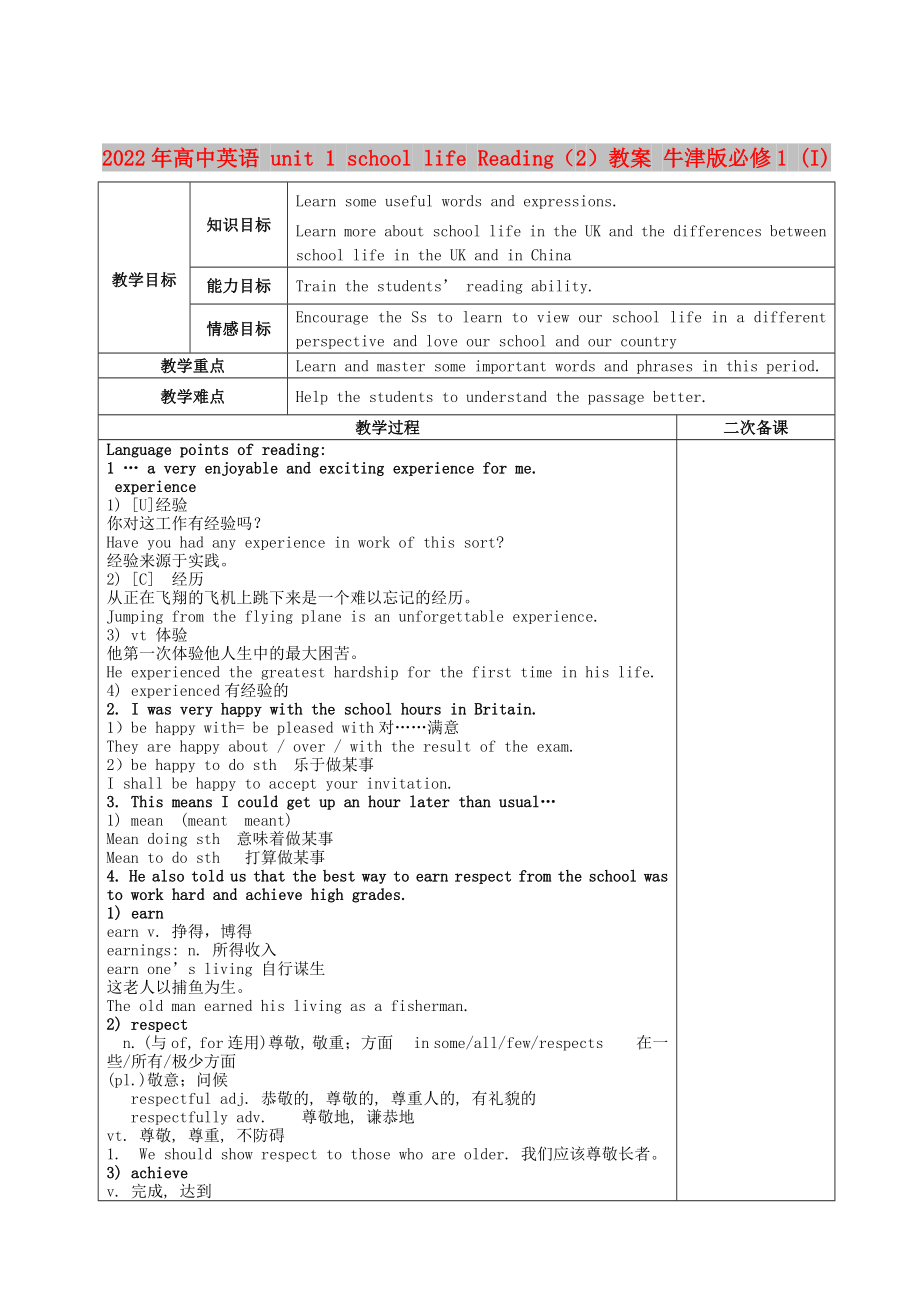《2022年高中英語 unit 1 school life Reading(2)教案 牛津版必修1 (I)》由會員分享����,可在線閱讀,更多相關(guān)《2022年高中英語 unit 1 school life Reading(2)教案 牛津版必修1 (I)(2頁珍藏版)》請?jiān)谘b配圖網(wǎng)上搜索�。
1、
2022年高中英語 unit 1 school life Reading(2)教案 牛津版必修1 (I)
教學(xué)目標(biāo)
知識目標(biāo)
Learn some useful words and expressions.
Learn more about school life in the UK and the differences between school life in the UK and in China
能力目標(biāo)
Train the students’ reading ability.
情感目標(biāo)
Encourage the Ss to learn to view o
2、ur school life in a different perspective and love our school and our country
教學(xué)重點(diǎn)
Learn and master some important words and phrases in this period.
教學(xué)難點(diǎn)
Help the students to understand the passage better.
教學(xué)過程
二次備課
Language points of reading:
1 … a very enjoyable and exciting experience for
3�����、 me.
experience
1) [U]經(jīng)驗(yàn)
你對這工作有經(jīng)驗(yàn)嗎�����?
Have you had any experience in work of this sort?
經(jīng)驗(yàn)來源于實(shí)踐��。
2) [C] 經(jīng)歷
從正在飛翔的飛機(jī)上跳下來是一個難以忘記的經(jīng)歷���。
Jumping from the flying plane is an unforgettable experience.
3) vt 體驗(yàn)
他第一次體驗(yàn)他人生中的最大困苦�����。
He experienced the greatest hardship for the first time in his life.
4�����、4) experienced有經(jīng)驗(yàn)的
2. I was very happy with the school hours in Britain.
1)be happy with= be pleased with對……滿意
They are happy about / over / with the result of the exam.
2)be happy to do sth 樂于做某事
I shall be happy to accept your invitation.
3. This means I could get up an hour later than usua
5�����、l…
1) mean (meant meant)
Mean doing sth 意味著做某事
Mean to do sth 打算做某事
4. He also told us that the best way to earn respect from the school was to work hard and achieve high grades.
1) earn
earn v. 掙得����,博得
earnings: n. 所得收入
earn one’s living 自行謀生
這老人以捕魚為生。
The old man earned his living a
6�、s a fisherman.
2) respect
n. (與of, for 連用)尊敬, 敬重;方面 in some/all/few/respects 在一些/所有/極少方面
(pl.)敬意���;問候
respectful adj. 恭敬的, 尊敬的, 尊重人的, 有禮貌的
respectfully adv. 尊敬地, 謙恭地
vt. 尊敬, 尊重, 不防礙
1. We should show respect to those who are older. 我們應(yīng)該尊敬長者����。
3) achieve
v. 完成, 達(dá)到
achievement: [
7�、U] 完成,達(dá)到����;[C]成就, 功績
make achievements 獲得成績�,取得成就
The university has achieved all its goals this year. 這個大學(xué)今年已經(jīng)實(shí)現(xiàn)了所有的奮斗目標(biāo)。
5. This is about the average size for British schools.
average adj. “平均的”或“平常的”�����。
average n. 平均數(shù),一般水平(通常不用復(fù)數(shù)形式)�����。
average vt. 平均達(dá)到
6. I found the homework was not as he
8、avy as what I used to get in my old school, but it was a bit challenging for me…
1) used to do 過去常常做某事
be used to do 被用來做��。�����。�����。
be/get used to doing sth./ sth.
習(xí)慣于/開始習(xí)慣于做��。��。���。
there used to be 某地過去有某物
There used to be a swimming pool in our town.
我們鎮(zhèn)上過去有一個游泳池�。
2) a bit和a little
9�����、
◆a bit和a little都可以修飾形容詞或副詞
的原級或比較級����。如:
It's a bit/a little cold today����。今天有點(diǎn)冷����。
He feels a bit/a little more tired today than yesterday.
他今天覺得比昨天要更累一點(diǎn)。
◆a little可直接加名詞而a bit須加of后才能加名詞��。如:
a little bread:a bit of bread一點(diǎn)兒面包
a little wood=a bit of wood一點(diǎn)兒木柴
a few bits of wood幾片木片
◆not a bit意為“一點(diǎn)
10��、不” = not at all����,而not a little意為“不是一點(diǎn)點(diǎn)”表示很多/
大,屬肯定意思���。如:
He is not a bit surprised at the news.
他對此消息一點(diǎn)不吃驚。
He is not a little surprised at the news.
他對此消息非常吃驚��。
◆bit前可用人稱代詞�����,意為“某人的一份力量”����,而little無此用法��。little可作不
定代詞�����,bit無此用法����。如:
We should do our bit for our country.
我們?yōu)樽鎳M自己的一份力�。
3)challenge n./v. 挑戰(zhàn)
challenging adj. 挑戰(zhàn)性的
He challenged me to play another tennis game.
他向我挑戰(zhàn)要我跟他再打一場網(wǎng)球。
課堂練習(xí)
課堂小結(jié)
課后作業(yè)
教學(xué)反思
 2022年高中英語 unit 1 school life Reading(2)教案 牛津版必修1 (I)
2022年高中英語 unit 1 school life Reading(2)教案 牛津版必修1 (I)

